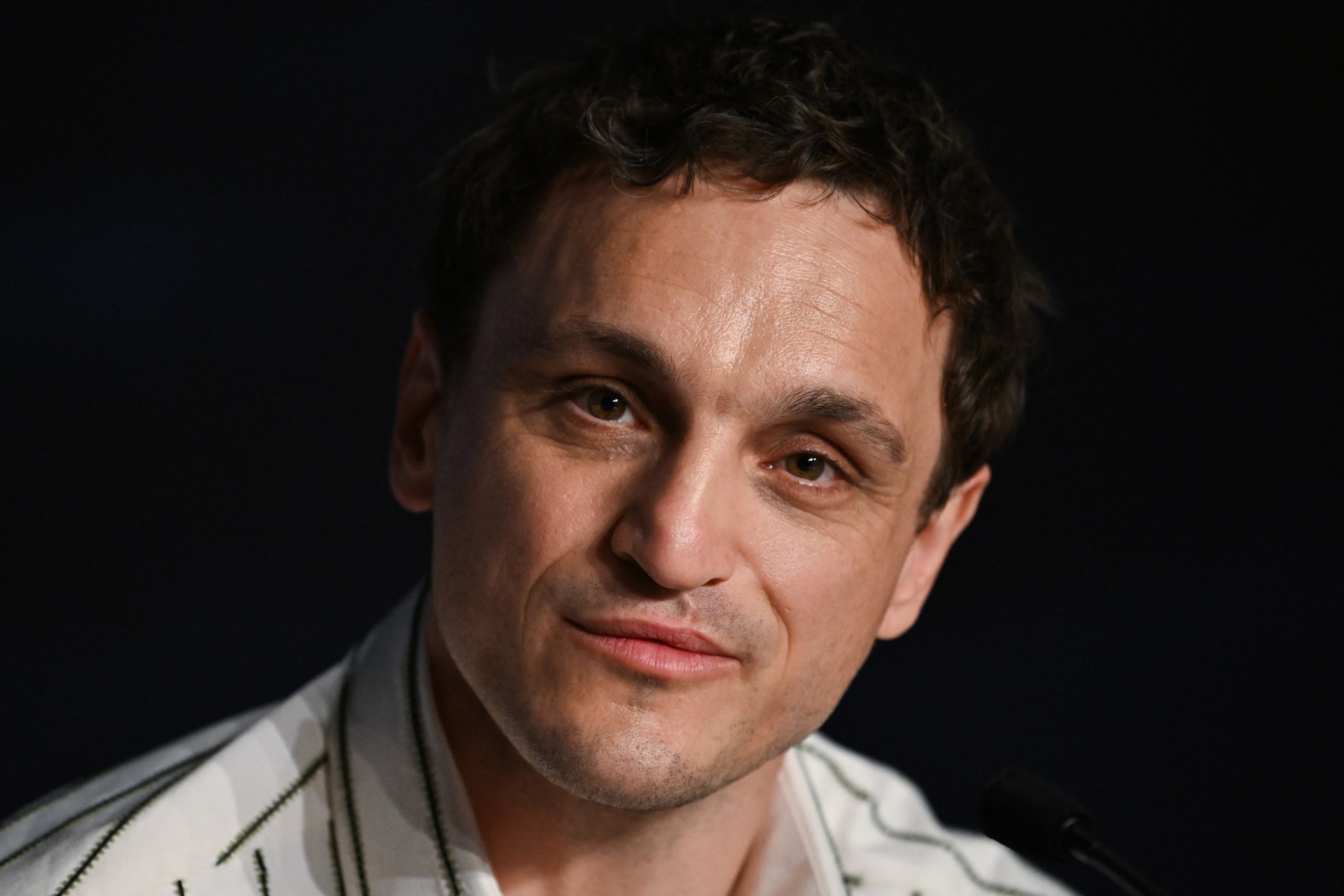Talking with Franz Rogowski, you wouldn’t know that Andrea Arnold’s Bird is one of the most acclaimed titles to play in the Cannes Film Festival 2024 competition so far. The lyrical coming-of-age drama, costarring Barry Keoghan, adopts the American Honey director’s classically freewheeling structure in its portrait of a 12-year-old named Bailey (newcomer Nykiya Adams) navigating a turbulent childhood. Bopping between the quick-fix schemes of her struggling single father (Keoghan) and the vulnerability of her younger siblings living with their mother’s abusive boyfriend, she finds unexpected solace in a mysterious figure who goes by Bird (Rogowski). Bird and Bailey accompany each other through difficult, emotional peaks and valleys; they find hopeful turning points amid the pain, earned through Arnold’s bracingly moving soundtrack and Robbie Ryan’s ever-vibrant camerawork.
Critics so far have widely embraced the approach. For Rogowski, continuing his streak of art house successes following last year’s Passages, the process of making and releasing the film has been complex, vague, solitary, and sometimes confounding—if still greatly rewarding. Arnold, known for her unconventional methods with actors, gave Rogowski limited information about the role he was playing, only handing him a given scene’s dialogue on the day of filming and keeping indications of Bird’s story arc to the bare minimum. As the film opens, you’ll see how this was especially odd for Rogowski, since Bird is at the center of the movie’s strangely moving final-act twist. By that point, though, the actor had figured out how to let go—with his luminous, empathetic portrayal anchoring each of Arnold’s fantastical turns.
Seeing the movie here at Cannes, though, has brought some of those feelings back up. Allow Rogowski to explain, nestled inside a quiet café just off of the Croisette.
Vanity Fair: You were filming this when we last spoke, and you’d been talking about how you were getting the scripts only on and for the day.
Franz Rogowski: That’s correct.
I did not know the role you were playing then. Having seen it, I imagine that was a pretty challenging way to work.
Oh yeah, it was. [Laughs] For sure. And I still don’t know who this person is. In the beginning, I was just listening. I was curious to hear what [Andrea Arnold] is up to, what her vision was and what she would like me to do to support her fantasy. And one of the first fantasies she shared with me was a naked man standing on a skyscraper, having a huge penis that is half-erected—and yeah. I said, okay, sure, sure. Sounds great. All of a sudden I was in.
She didn’t share any lines before [shooting the scene]. We had no idea about the entire story, but we would get script lines or scenes maybe three, four days prior to the day of shooting. And then you would memorize your lines, but you would not get the chance to prepare a nice scene. It would be rather about you being open and spontaneous and willing to sacrifice your strengths as an actor to open up to something that would be, rather, based on the moment.
Did you have even the broadest sketch of Bird’s backstory?
I knew that he was looking for his father, so I knew, “Okay, I have a father.” Then there was some costume rehearsal with insane feather costumes, so I knew—I’m on a project called Bird, I’m wearing a feather costume, maybe I’m the bird? Am I one of the birds? One of the flock? I knew that I would support a girl that was going through puberty and has a lot of things to overcome, but I never knew where she’s coming from. Sometimes Andrea would tell me she just went through a lot or she’s in pain or accompany her. We did a lot of things that are not in the movie. So what you see is the tip of the iceberg. There used to be a lot of stop-motion camera work.
In your first scene where you’re in this meadow, you approach a young girl in an unconventional costume. How did you choose to play it based on what was very limited information?
What you see there is a guy crossing a meadow and saying hi. And that’s me saying hi, in the costume of a bird. Day by day this character built and grew, and I had a couple of images and music that I was carrying with me. I slept in a camper van on a campsite close to Gravesend, where we shot most of the movie. That was a beautiful way of preparing. It was more about atmosphere and mood and psychology. So I just brought this mood to the meadow, and then we started shooting. I still listen to that. It’s an album called Bird. It’s mostly Max Richter, Kate Tempest, Brian Eno, John Hopkins—a lot of ethereal, almost spiritual music.
Did you make the album?
It was her music. I felt like, “Okay, I’m in her hands.” I stopped worrying. I just surrendered to her process. That meant no script, no preparation, no character. Just go for it.
And in that first scene, the descriptor was that you’re dressed like a bird?
The costume was a bit of a shock for me at first because I felt like, “Okay, this brown skirt, then this pullover.” I worried I seemed a bit like a pervert that needs to approach these children and maybe scare them. I didn’t want to be that. I wanted to be another bird. But then once we started shooting, I understood it. It made so much sense because Bird is not attached to the world that they live in. The reason why I felt so weird in the costume at first was because I ultimately want to be attached to some kind of culture that I believe in. And this costume is really disconnected from most of the cultural references that we want to be associated with. That made sense for this Bird, an outsider observing culture and society from the outside, from above.
The strength for us was in the uncertain and the unknown. So when you prepare, you wonder, okay, what’s the center of gravity that I want to work with for this character? Even though she told me, “You can always call me, we can always talk about the character,” with her sharing so little information with me, I felt like, Okay, she wants me not to know. She is just being kind and she wants to be there for me. But what she ultimately would like is for me to trust her and to surrender and to give up everything that I need to be and just be who I am. And that’s terrifying because I hate myself. [Laughs]
It sounds like she had a tough time too. She’d said recently that this was the hardest edit she’s ever done.
Yeah, for sure.
Can you say more about that difficulty for yourself on this one?
Well, for me it is: Seeing yourself on screen is always slightly disappointing. You feel like you try so many things and then you see what you were actually able to achieve and it’s depressing. But then you get this overwhelming feedback and response from the audience and then you realize, “Okay, my opinion is not that important. Maybe let’s just celebrate.” People apparently like it. [Laughs] I am thankful for that.
Your reaction was more complicated.
I think I need to see a psychologist.
What do you mean by that?
[Laughs] My self-awareness is worse than I thought. The perspective that I have on myself is very judgmental, and I should be more kind and more forgiving to myself. I remember talking to Andrea during the editing process. I wasn’t part of the editing process, but I talked to her, and when she was telling me about going through a hard time in the edit. I told her, “Be kind to yourself. Allow yourself to struggle. Allow yourself to take time and to take detours.” It’s easy for me to tell her, but it’s harder for me to tell myself. I’m not my best friend, but I want to be. I think it’s important if you want to grow up. Being an adult also means to be a father to your own inner child.
Very true to the spirit of the movie.
Yes. Somehow I’m not, but I want to be. I want to accompany myself and be kind.
It’s interesting that in this movie, you are that comfort, that sort of soothing center—
It’s called acting. [Laughs] The truth is I’m torn. I’m trying to be that comfort zone and I’m trying to be there for her. And I’m trying to be a person that is, to a certain extent, open, vulnerable, and grounded. But the truth is, I am these things, but I’m also many other things. I just want the best version of myself, and I don’t want to get all the other nuances. But I think a good director is interested in the whole spectrum. That’s also painful to a certain extent.
Have you ever thought about not watching yourself?
Yeah, I have. Just try to record [yourself] and then listen to it. It’s depressing. Like, “Oh my God, that’s me? I’m not even able to say one line in a nice, sharp, sexy and simple way? Modest, but to the point?” We look at ourselves and family pictures and we are like, “Oh God, I’m so ugly.” Five years later you think, “Oh God, I was actually handsome back then, and now I’m ugly.”
How did the rest of the movie strike you, beyond your presence?
I was overwhelmed. I had never heard the full story! And then being with Nykiya, seeing her coming-of-age story was heartbreaking. Andrea is so musical, so she put music in almost all the scenes; it felt a bit like the soundtrack of someone that has the experience of life but is transforming again into the body of a teenager and creates a soundtrack to her own fantasies. Again, we shot so many scenes that are not in the movie that I felt like, wow, we’ve really created this mountain, this giant mountain. What we get to see is the tip of the iceberg. It feels great to be a part of the whole thing.
You mentioned watching the film with Nykiya. Did she have a similar experience making it to yours?
Everybody shot chronologically, but I have no idea how much she knew before [production]. I don’t even know. I don’t even know Nykiya. [Laughs] We only met in the scenes and then the night of the premiere, drinking a glass of water and smiling at each other and taking some pictures together. We never got the chance to just hang out. We only know each other from this universe of Bird.
And you were living in the camper van nearby at that time. Did it get a little lonely, the filming of a movie this way?
Yes, but in a good way. I’m a loner.
This interview has been edited and condensed.
More Great Stories From Vanity Fair
Peter Thiel, J.D. Vance, and the Dangerous Dance of the New Right
Ivanka Trump, Sensing Power, Slinks Back to the National Stage
An Epic First Look at Gladiator II
Looking for Love in the Hamptons? Buy a Ticket for the Luxury Bus.
The Dark Origins of the True-Crime Frenzy at CrimeCon
Palace Insiders on the Monarchy’s Difficult Year
The Best TV Shows of 2024, So Far
Listen Now: VF’s Still Watching Podcast Dissects House of the Dragon



